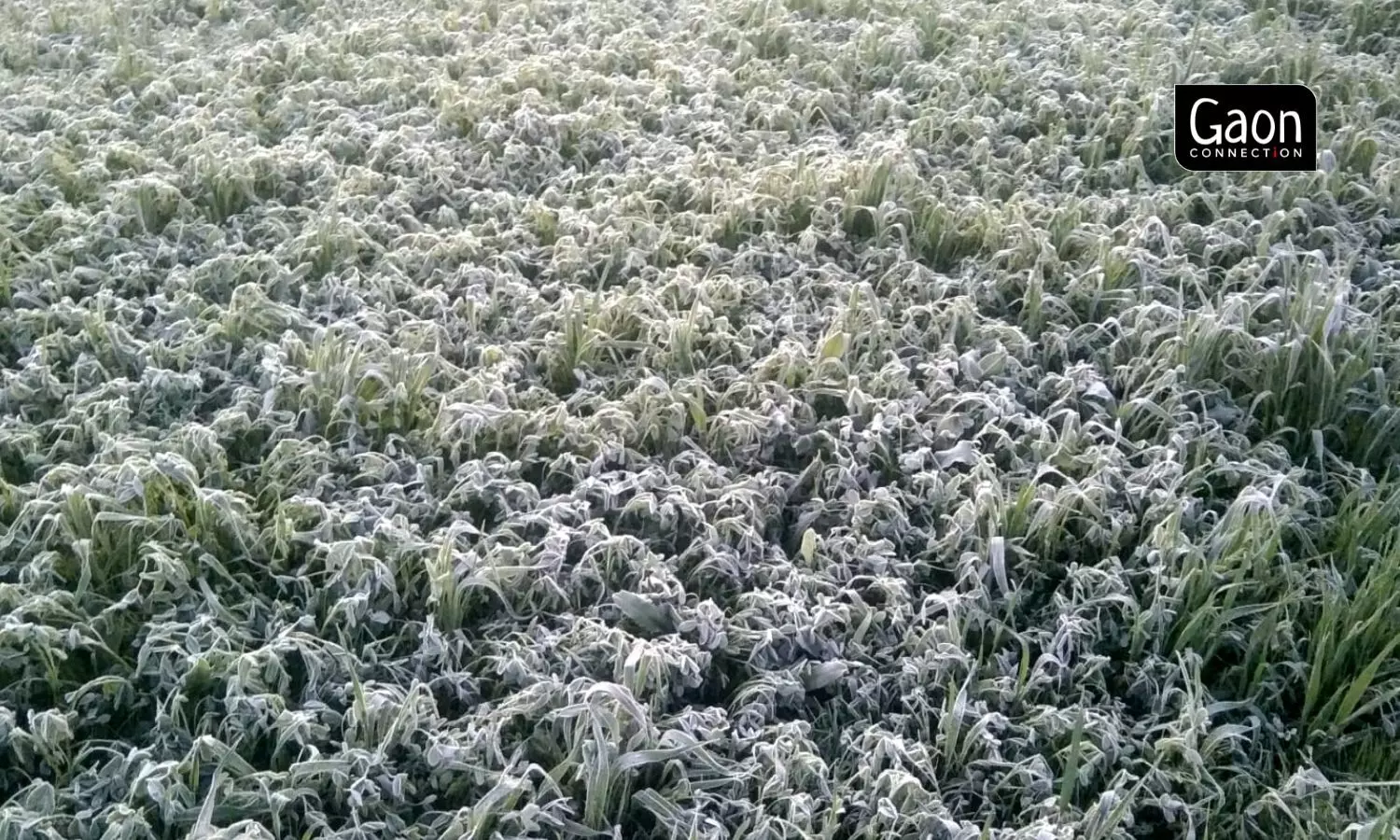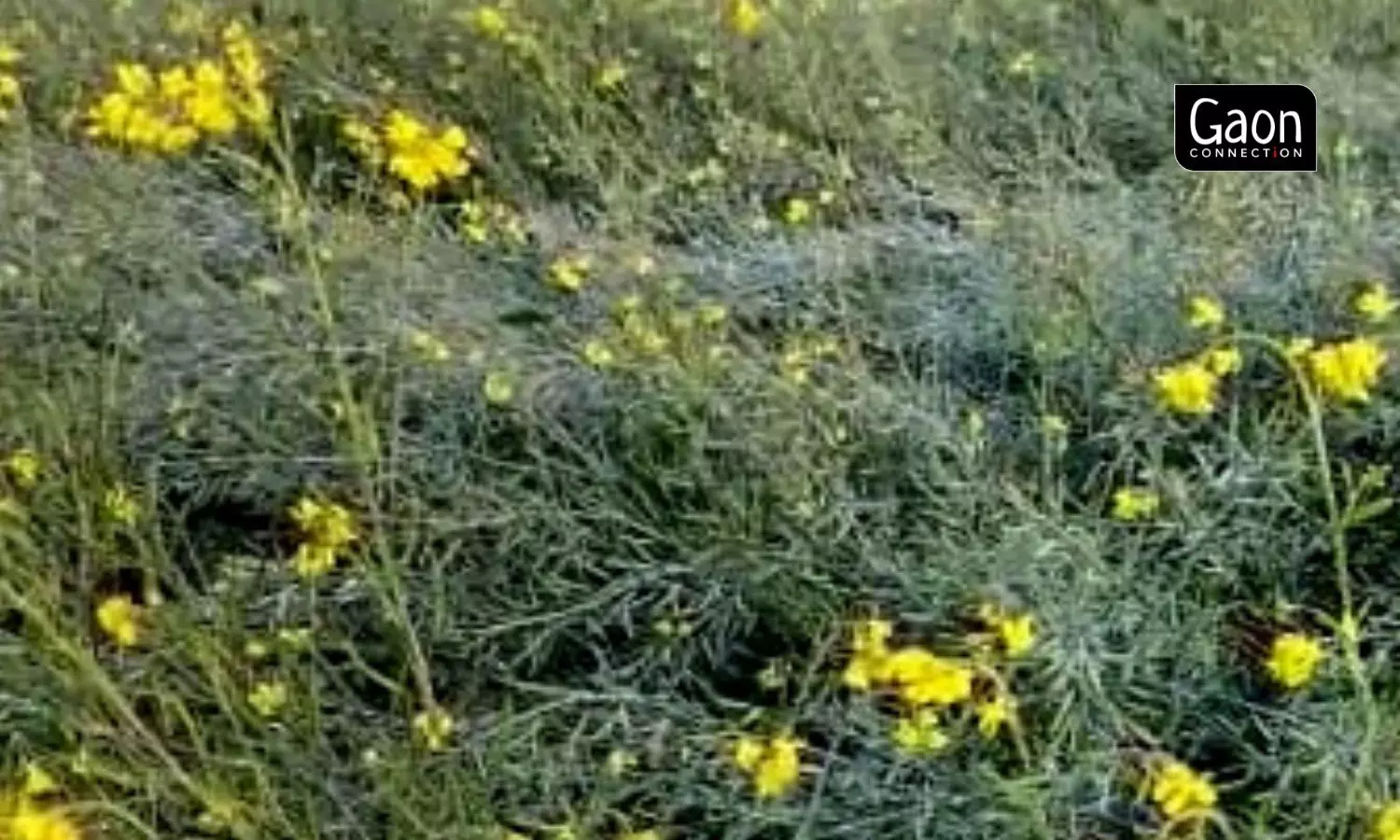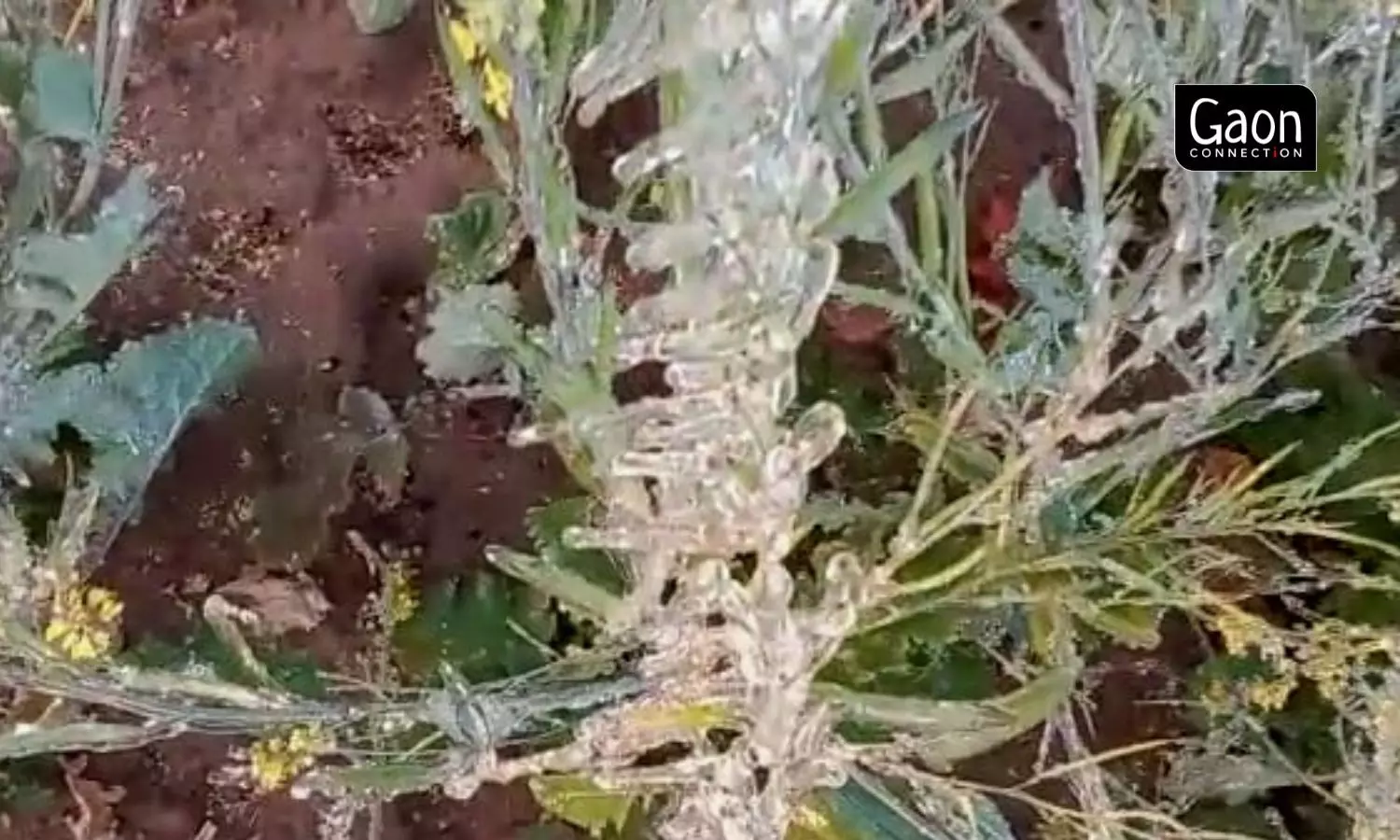Jaipur, Rajasthan
Farmers in the districts of Sikar, Sri Ganganagar, Hanumangarh, Jaisalmer, and Barmer in Rajasthan are despairing. The cold wave that has gripped north and northwest India has caused severe ground frost which has destroyed their crops of mustard, cumin, castor, and vegetables.
Raysingh Jakhar Bansriwala, from a village in Hanumangarh district lamented that nearly 40 per cent of his mustard crop was destroyed due to the cold and frost. “The cold wave and the rainfall were devastating. Added to that, because of the maintenance work at the Indira Gandhi Canal, we got no water for irrigation,” Bansriwala told Gaon Connection.
Mustard is one of the major crops of Rajasthan and the north western state alone contributes 43 per cent of the total mustard seed production in India. In Rajasthan, Alwar takes the lead as the major producing district followed by Shri Ganganagar, Bharatpur, Tonk, Sawai Madhopur, Baran, and Hanumangarh.
In Sri Ganganagar and Hanumangarh district around 556 hectares of land are under mustard. Farmers there fear 40 per cent of the mustard crop will be destroyed if the cold wave continues. According to them, the temperature has dipped up to minus 2.8 degree Celsius in some places, which is unusual for the desert state.
Also Read: Explained: Here’s how climate change will impact India’s winter season this year
“The only way to beat the frost is through adequate irrigation. Watering the land in the mornings helps in mitigating the harm done to the land by frost,” Prahlad Nojal, from Chapawali village in Sri Ganganagar district, told Gaon Connection.
But as the power supply to the village is only at night, the farmers can irrigate their lands only at that time when the temperature dips to near zero. “It would be much better if there was electric supply in the daytime and we could water our land in daylight. But who in the administration cares about farmers. While the government is busy delivering speeches, we are bearing the loss,” Nojal complained.

The only way to beat the frost is through adequate irrigation. Watering the land in the mornings helps in mitigating the harm done to the land by frost.
According to the Jaipur office of India Meteorological Department (IMD), this is the first time since January 3, 2014, that the temperature has dipped to minus 2.7 degree Celsius. Before that, in 1974, the temperature dropped to minus 4.6-degree Celsius in Churu, which was the lowest temperature ever recorded in the state.
“We did issue a warning to the state government that this year the ground frost would occur from January 14 onwards. While ground frost in this season is not uncommon, the problem arises when it remains for more than two days. That is disastrous for the crops,” Radhey Shayam Sharma, director of the IMD’s Jaipur office, told Gaon Connection. He said the situation would return to normal from January 18.
Also Read: Rising heat, sinking groundwater and violent conflicts over irrigation in UP. A ground report
Whereas farmers are reporting up to 40 per cent loss of their mustard crops, an official assessment is yet to be done. Ascertaining the extent of the losses is not possible immediately, said B R Bakolia, assistant director of Rajasthan Agriculture Department, Hanumangarh district.
“We will be able to tell about the losses only in the next few days. If there is rainfall in the next two days, things might improve. If not, there may be more damage,” he warned. “Our officials will go on field to prepare a report on the damage caused, especially to mustard,” the assistant director told Gaon Connection.

Mustard is one of the major crops of Rajasthan that contributes 43 per cent of the total mustard seed production in India. The cold wave has a severe impact on mustard leaving farmers in distress.
According to farmers, if there is frost before the mustard seed ripens, it kills the plant. Therefore, it is important to keep the land irrigated to avoid damage, Nojal explained. But it is getting colder every year at Sri Ganganagar, the farmer said. “The temperatures falling to four degrees is normal, but it is getting colder by the year and this year was the worst so far,” he added.
Meanwhile, P K Rai, director of Bharatpur-based National Research Centre on Rapeseed-Mustard (NRCRM), which is an ICAR (Indian Council of Agricultural Research) institute, warned that improper irrigation could damage the situation more. “Irrigating the land from time-to-time ensures there is no dryness, especially in places where the seeds are not yet ripened fully,” Rai told Gaon Connection.
Pomegranate, castor, cumin crops affected
In Barmer district, farmers are calculating the losses caused to their pomegranate, castor plant, cumin, and mustard plants. “Nearly 30 per cent of pomegranate, 70 per cent of castor and 50 per cent of mustard is destroyed in the district,” Hastimal Rajpurohit, a farmer from Barmer, told Gaon Connection. He worried about repaying bank loans, paying electricity bills and so on.
“Electricity is supplied only for two to three hours in a day with lots of tripping. No politicians are worried about our well-being,” Rajpurohit complained.

According to farmers, the temperature has dipped up to minus 2.8 degree Celsius in some places of Rajasthan, which is unusual for the desert state.
It is expected that the ground frost will continue for another two to three days. This means more crops will be destroyed, greater losses for farmers and a definite price rise in the cost of the produce, worry the farmers.
Also Read: Farmers in Uttar Pradesh crushed by drought and drowning fields
Protest against power cuts and lack of irrigation water
Farmers in Sikar district have been protesting at Dodh village for the last four days about the irregular supply of electricity in villages which is making it difficult for them to keep their lands irrigated.
“Power supply is not stable. Sometimes power supply stops within only six minutes of it coming on,” an irate Ram Ratan Bagadiya from Bhuwala village in Sikar district told Gaon Connection. According to him, there is already a 60 per cent loss in vegetables and 40 per cent loss in mustard. “We demand the government compensate us for the loss and provide us proper electricity,” Bagadiya said.













